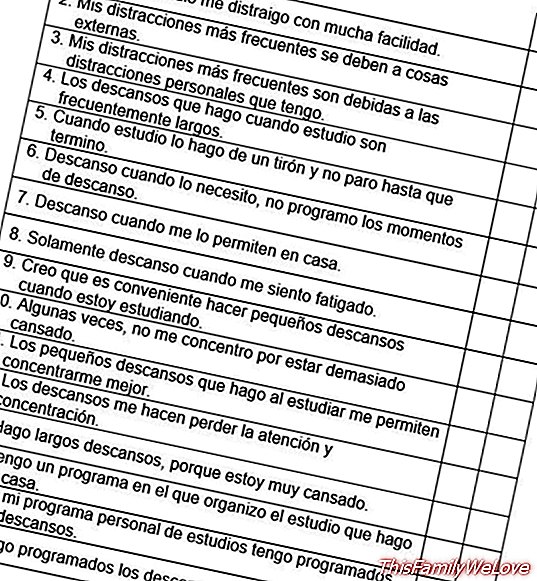Learn to concentrate: how to achieve more attention
The 8 percent of children have attention problems; a figure that can increase up to 15 percent, as more and more cases occur. However, we do not refer to cases that require psychological attention, such as attention deficit disorder ADHD, with or without hyperactivity. We are talking more about the concentration (or lack of it) as normal capacity, which has more to do with will and effort.
Concentration is effort
To achieve an improvement on this point, as Alfonso Aguiló states, "adolescents have to make an effort not to depend too much on well-being, not to be people who fall short at the time of small discomfort or discomfort, or physical effort. to concentrate on what they should do, even if it requires them to stand for a long time, or sit in an uncomfortable place, or endure in a situation of some tension ".
In that sense, it is very positive to find chores and skills that strengthen your ability to concentrate and to set goals. Tasks in which you see that it yields, in which you feel safe, satisfied, stimulated: playing a musical instrument, to learn languages, to develop a sport, to be interested in history or painting, to become interested in astronomy, DIY, photography, etc. In this way, they will achieve ever greater independence from the inertia that we could call corporal and, thus, they can then propose and reach other more serious life projects.
If we can get our children to discover the satisfaction that comes from committing to a task that stimulates their ability and makes them feel committed to something that puts them to the test and leads them to develop new areas of their talent, then they will have entered the cycle of motivation . Otherwise, the scope of the intellectual tasks that they may enjoy in the future will be very limited, since they will be disproportionately arid and ungrateful.
Factors that favor attention-concentration
Attention is the process through which we select some stimulus from our environment, that is, we focus on a stimulus among all those around us and ignore all others. We tend to pay attention to what interests us or our own motivations. Thus, attention and interest are intimately related, as is attention and concentration.
The factors that favor attention-concentration are: - Interest and willingness to study.
- Plan the study of a chapter or the development of a problem in a very specific way, for a short period of time.
- After two hours of study, rest briefly to relax from the concentration maintained until then.
- Change the subject of study: this way, concentration can be maintained for a longer time. If you dedicate an hour to a subject by taking two 5-minute breaks, you can devote another two hours to different subjects, with a little more extended breaks of 8-10 minutes without falling concentration.
- Take notes: if during the explanations of the teacher we are attentive to synthesize mentally and written in short sentences the details of interest, attention is exercised. Handwriting facilitates memorization and learning.
Questionnaire to autoanalyze attention
I analyze how my breaks and "downs of attention" are. Put an X under the YES or NO, depending on your situation in the following statements.

Tips that can help you focus
- Chess or learning to play a musical instrument it means effort and concentration. They are tasks that suppose a demanding development of their capacities and for this reason they will help them in their learning process.
- In many cases, the care is involuntary; Something that crosses our visual field can distract us without wanting to. Therefore, it is important that when studying (perhaps not very rewarding task in itself) prepare the material very well so that there are no distractors "in sight". For example, the adventure book that is being read, the mobile, a magazine * · Not all concentration is good: you can be very focused on something useless, or even something harmful. Many, for example, spend a lot of time getting bored in activities like watching television hours and hours every day, which hardly gives them anything positive or tests their skills.
- The attention is not unlimited. Thirty or forty minutes in a row, intense and productive, is more than enough. The programmed rest guarantees the effort and the following attention, provided that it is not excessively long and so crazy that it produces an irremediable deconcentration.
Ignacio Iturbe
Advice: Pilar Martín Lobo
It may interest you:
- Hyperactivity and attention deficit: ADHD
- Guidelines to establish study habits
- Handwriting facilitates memorization and learning
- All the benefits of learning to play an instrument




